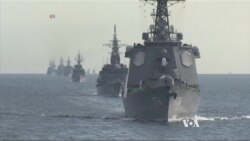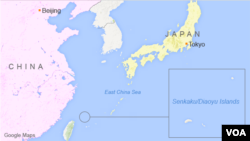Beginning his first Asia tour, U.S. Secretary of Defense Ashton Carter laid out the U.S. commitment to Japanese security Wednesday in Tokyo, urging restraint in territorial disputes between Japan and China.
China’s dispute with Japan over Japanese-controlled islands in the East China Sea and its controversial actions in the South China Sea set the backdrop for U.S. Secretary of Defense Ash Carter’s talks with Japan’s defense minister.
"We don't, as we frequently say, take a stand in any of those territorial disputes. We take a strong stand against the militarization of these disputes," he said.
Responding to Carter's statements, Chinese foreign ministry spokeswoman Hua Chunying called on the U.S. to be "more responsible."
"Now as you call can see, China and the relevant countries have reached a consensus to continue to push forward for the resolution of the relevant issue through dialogue," Hua said.
"We hope the U.S. side can respect the wishes of China and relevant countries to resolve the problem through dialogue, say more responsible things, and make more responsible moves, so it can genuinely play a constructive role in maintaining regional peace and stability," she said
President Barack Obama last year confirmed that U.S.-Japan security treaties apply to East China Sea islands that are at the center of a dispute with China.
In recent years China has challenged Japan's control of the uninhabited islands, which are called Diaoyu in China, with repeated air and naval patrols near the disputed territory.
China has used similar assertive tactics to strengthen its wide-ranging claims to other disputed areas in the nearby South China Sea, unnerving many of its neighbors.
Rebalance to Asia-Pacific
Carter’s meeting with Defense Minister Gen Nakatani reaffirmed the U.S. rebalance to the Asia-Pacific, which involves shifting more political and military weight to the fast-growing region.
It’s a shift Japan expert Sheila Smith said is very important.
“We are at a particularly critical moment, I think, in the Asia-Pacific. And everybody looks over across the Pacific and they see this rising new China,” she said.
Chinese defense spending has increased by double digits for five consecutive years. The United States is counterbalancing this rise by strengthening regional alliances, but says it does not want to contain China.
Carter’s Tokyo meetings are aimed at firming up Japan’s new guidelines on defense cooperation with the United States.
“I think the guidelines are going to be very effective in making sure that nobody miscalculates the importance of this alliance for both of our countries,” Smith said.
In China, state-backed media claim Japan is using the United States’ increasing reliance on its Asian ally to enflame tensions on historical and territorial issues.
Officials will finalize the Japan guidelines at the end of this month when Prime Minister Shinzo Abe visits President Barack Obama in Washington. They’ll include new security cooperation in cyber and space domains and increased military coordination.















